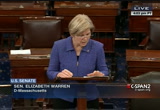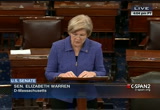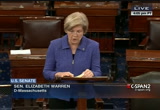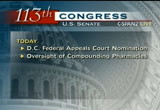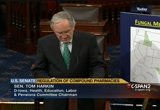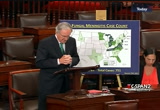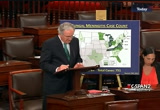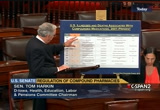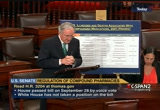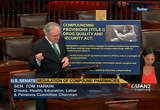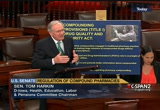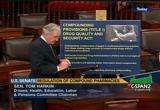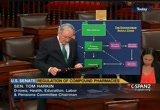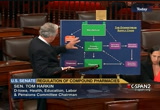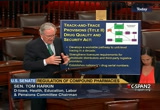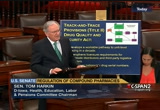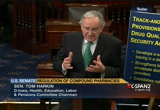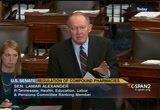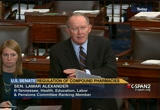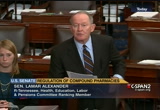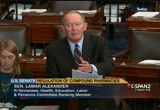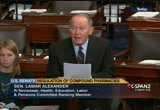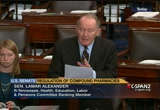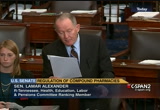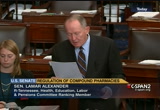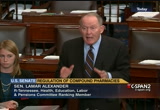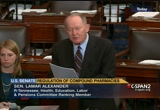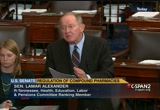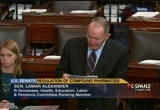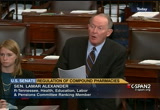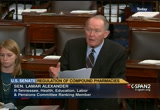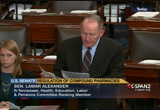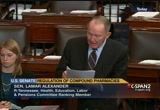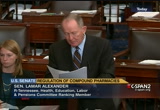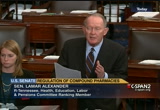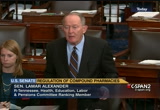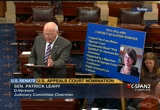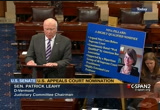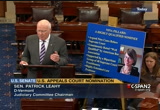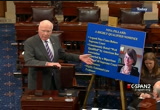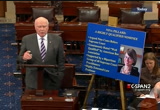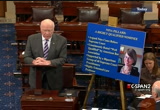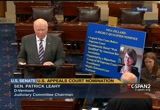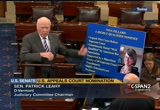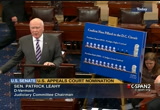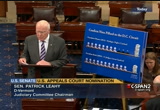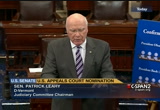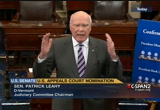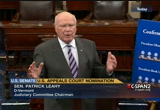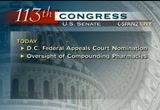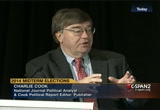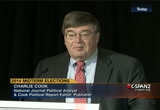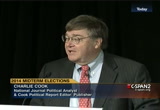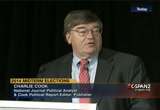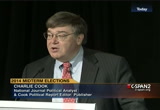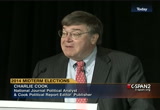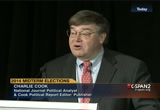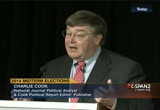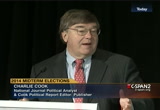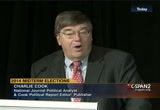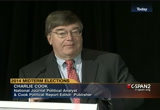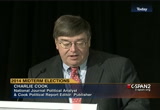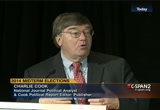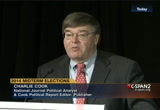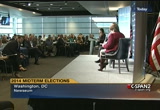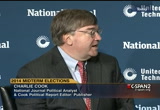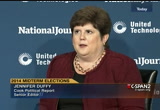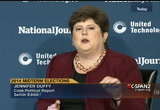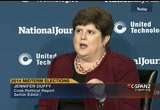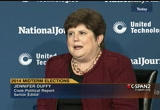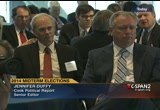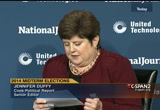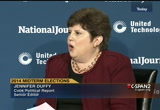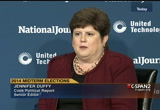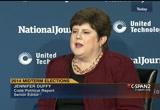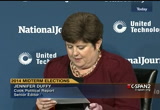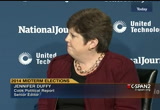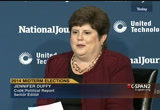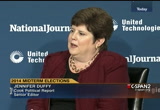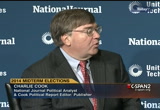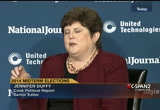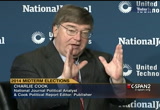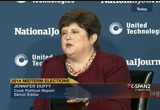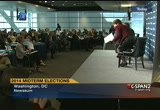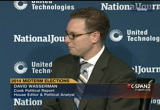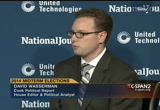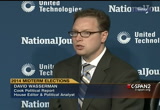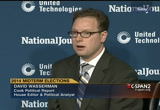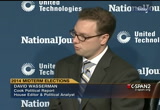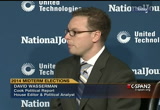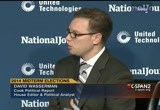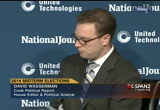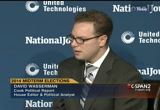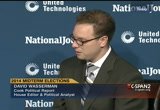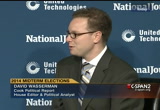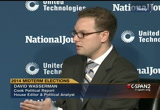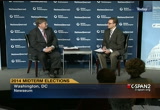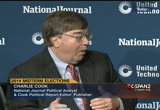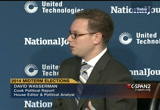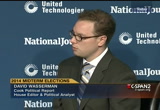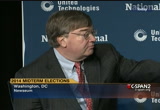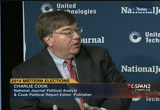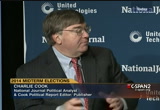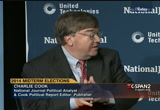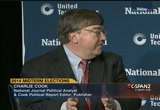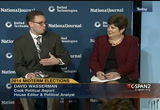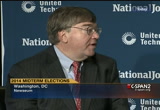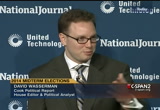tv Key Capitol Hill Hearings CSPAN November 12, 2013 7:00pm-9:01pm EST
7:02 pm
ms. warren: mr. president? the presiding officer: the senator from massachusetts. ms. warren: i ask unanimous consent the senate proceed to a period of morning business with senators -- the presiding officer: the senate is in a quorum call. ms. warren: i ask that the quorum call be vitiated. the presiding officer: without objection. ms. warren: thank you. i ask unanimous consent the senate proceed to a period of morning business with senators permitted to speak for up to ten minutes each. the presiding officer: without objection. ms. warren: mr. president, i ask unanimous consent the senate proceed to the immediate consideration of calendar number 227, s. 1557. the presiding officer: the clerk will report. the clerk: calendar number 227, s. 1557, a bill to amend the public health service act to
7:03 pm
reauthorize support for graduate medical education programs in children's hospitals. the presiding officer: is there objection to proceeding to the measure? without objection the senate will proceed. ms. warren: i further ask that the bill be read a third time and pafpbd the motion to reconsider -- and passed and the motion to reconsider be considered made and laid on the table with no intervening action or debate. the presiding officer: without objection. ms. warren: i ask unanimous consent the senate proceed to the consideration of calendar numbers 239 and 240 which are post office naming bills en bloc. the presiding officer: the senate will proceed to the measures en bloc without objection. ms. warren: i ask unanimous consent the bills be read a third time and passed en bloc and the motions to reconsider be laid on the table en bloc with no intervening action or debate. the presiding officer: without objection. ms. warren: i ask unanimous consent the senate proceed to
7:04 pm
the consideration of s. res. 290 which was submitted earlier today. the presiding officer: the clerk will report. the clerk: s. res. 290 commemorating the 75th anniversary of kristallnacht or night of broken glass. the presiding officer: is there objection to proceeding to the measure? without objection, the senate will proceed. ms. warren: i ask unanimous consent the resolution be agreed to, the preamble be agreed to, and the motion to reconsider be laid on the table with no intervening action or debate. the presiding officer: without objection. ms. warren: i ask unanimous consent that when the senate completes its business today it adjourn until 10:00 a.m. on wednesday, november 13, 2013, and that following the prayer and pledge, the morning hour deemed expired, the journal of proceedings be approved to date and the time for the two leaders be reserved for their use later in the day, and that following any leader remarks the senate be in a period of morning business for one hour with senators permitted to speak therein for up to ten minutes each with the
7:05 pm
time equally divided and controlled between the two leaders and their designees with the majority controlling the first half and the republicans controlling the final half. and that following morning business the senate resume consideration of the motion to proceed to h.r. 3204, the pharmaceutical drug compounding bill postcloture. further that all time during adjournment, recess and morning business count postcloture on the motion to proceed to h.r. 3204, and finally that the senate recess from 12:30 p.m. until 2:15 p.m. to allow for the weekly caucus meetings. the presiding officer: without objection. ms. warren: if there is no further business to come before the senate i ask that it adjourn under the previous order. the presiding officer: the senate stands adjourned until senate stands adjourned until
7:06 pm
7:07 pm
7:08 pm
it medications. last year 64 people died of meningitis after receiving contaminated medicine. inspections found unsanitary conditions at the pharmacy. in september the passed a bill to regulate compounding pharmacies. here's a look at some of today's senate debates. >> first of all madam president, i ask unanimous consent that nathan brown at detailer on my staff consideration of h.r. 320 for the drug quality and security act. >> without objection. >> i ask unanimous consent the benjamin friedman freedman of my staff be granted for privileges for the duration of today's session. >> without objection. >> madam president, i have high
7:09 pm
hopes of the senate will vote to enact a drug quality and security act. the so-called compounding and patient tracking bill. this legislation helps ensure the safety of drug products and it's also secures the pharmaceutical supply chain. i'm pleased to report that it's a product of excellent bipartisan collaboration on the health education labor and pensions committee where i worked closely with the ranking member my good friend senator lamar alexander. it also reflects productive cumbre stations with their colleagues in the house including chairman upton and ranking member waxman of the house energy and commerce committee. the house passed this bill on september 28 and now it's our turn to do our part. madam president title i have the bill addresses drug compounding and this is basically what happened here just over a year
7:10 pm
ago when we were shocked to learn one of the worst public health crisis we have experienced in receipt years there was a meningitis outbreak that climbed the lives of 60 or americans sickened people in 20 states. you can see the hardest hit were the home state of senator alexander, 153 indiana 93 michigan 264 jim eads 54 new jersey 51 florida 25. 20 states and a lot of people got really really sick. i will be talking in a minute about some of those that still linger today. what this outbreak did is it brought attention to the legal and regulatory gaps that allow the owners and managers at the new england compounding center to disregard basic procedures to ensure that the products of they were manufacturing were sterile and safe.
7:11 pm
this gross negligence had heartbreaking consequences for families nationwide. patients that were sickened, patients like karina baxter whose three adorable children lost their mother. the community lost a dedicated math teacher and tutor and she died at age 56. don elliott from indiana used to scuba dive in her free time is now an unrelenting pain and has had to give job and deplete your savings. evelyn bates from michigan was diagnosed last september and continues to struggle with tremendous pain every day and his daughter had to quit her job to take care of her. dennis locke who lives on the west virginia ohio border with his wife and three young children have had to watch their father go from being an involved parent with a steady income to a
7:12 pm
man whose daily life feels in his own words like a slow and torturous death. these meningitis outbreaks linger on. it has kind of a personal sensitivity to me. my older brother some years ago when death at a very young age because of meningitis. so it has lingering effects for a lifetime. that is what happened a little over a year ago. although we know that it wasn't isolated. it was the biggest that this chart which is kind of hard to read shows a going back to 2001. we have had four, 11, 64, 18. every year we have had some results that we have noted from compounding that made people sick or caused death.
7:13 pm
this has been ongoing for a long time. it's just that what happened a little over a year ago in tennessee and these other states sort of the dam broke. it's just beyond all comprehension how many people got sick and died. again in response to these facts beginning last year senator alexander and i convened the members of the health committee with assistance from senators franken and senator roberts in an effort to identify the gaps in the current policy to solicit stakeholder views craft bipartisan legislation to better ensure the quality of compounding drug products. we formally solicited three rounds of public comment and we helped to public hearings before marking up the bill last may. over the summer we worked with our colleagues in the house to craft a package with strong bipartisan and bicameral support
7:14 pm
now the compounding provisions of this bill are an unqualified step over it from current law and practice. basically what this bill does is compounding in title i and we will get to title ii in the second. it distinguishes compounding in pharmaceutical practice from those making large volumes of compounded drugs without individual prescriptions. those who wish to remain in traditional compounding that we might know where they make small amounts for a certain type of illness or for a certain hospital and that type of thing, they stay under the state towards a pharmacy as they are in current law. an entity that neither stays within those limits of traditional pharmacy compounding nor registers as an outsourcing facility, if they don't do one of those two they are illegally selling drugs.
7:15 pm
it distinguishes. it defines a food and drug administrations role in oversight of these outsourcing facilities. they will be subject to fda oversight in much the same way as traditional drug manufacturers are today. fda will know who these outsourcers are and what they are making and adverse event reports about compounded drugs and have the authority to conduct risk-based inspections. in other words, these lines of responsibility are more clearly defined. i give much credit to my friend from tennessee for continuing -- what's that about raising the flag, who has the flight? is sort of a confusing mess for everybody about who is responsible and who wasn't and thanks to senator alexander we have cleared that up in this
7:16 pm
bill. the bill offers providers and patients better information about the compounding drug, and it and directs fda to make a list of fda facilities available on their web site. it requires detailed labeling of compounded drugs prohibits false and misleading advertising and finally requires current law regarding the pharmacy compounding and strikes the unconstitutional provisions that were in current law which kind of led to a lot of this mess. we had different courts and different parts of the country interpreting it differently. it resolves that patchwork and applies a uniform standard nationwide. that is title i. title ii of the bill is the track and trace provisions. that basically, this committee
7:17 pm
began again working in a bipartisan fashion a little over a year ago and you may remember we bought -- brought an fda bill to the floor and it passed and signed by the president. that cleared up the part of where drugs come from, in other words from the initial, from the plant derivation to the distilling of the products of the way up to the manufacturing. so now we have a much better regulation picture of drugs that come from china and indonesia and the u.s., no matter where they come from up to the manufacturing step. but we didn't have at that time was a real understanding or an agreement on a hit. our committee got involved in this and again senator alexander helping lead the way with senator bennett then senator
7:18 pm
burr for almost two years working on this issue. now we have this system and i think this chart shows as i said everything up to the manufacture we took care of any fda user bill. this bill takes care of the manufacture down to the dispenser, that is down to the consumer. no matter where the drug goes, whether goes directly from the manufacturer through a wholesaler to a dispenser or whether goes from here to a secondary wholesaler, another secondary wholesaler and other secondary wholesaler, we found in these countries there's kind of a patchwork, all kinds of different ways were chucking it from a manufacture down to the consumer. senator burr, senator bennett and senator alexander and her staff worked together on this to get this picture put together and to have a track and trace so
7:19 pm
we can track the drugs no matter how it goes and we can trace it and track it. that will come into being over 10 years with electronic interoperable products. you might say well 10 years is a long time. i point out the house had 27 years and they agreed with us and made it 10 years but that's for electronic interoperability. beginning in january of 25th teen, january 2015 they will have to start a paper tray so there will be paperwork and will take 10 years to get it all at the unit level and all electronically and irreparable and you can understand it takes a long time. different manufactures and different suppliers and different systems so this will be worked in over that period of time that we will have tracing after january 2015. it establishes nationwide drug
7:20 pm
members and requires a pathway to tracing. as i said it strengthens licensure requirement for wholesaler distributors and third-party providers and again there was a lot of hodgepodge of different kinds of licensure's for wholesalers and we strengthened the up. then as i said we have a nationwide serial number established for that and that will come in four years after the date of enactment that will serialize drugs consistently. again this is a bill that many might say is long overdue but better late than never. i am sorry it took a terrible calamity like the outbreak of meningitis to get us to really
7:21 pm
focus on this and move it, but it did and i think this again is a good example again of where the congress can work in a bipartisan bicameral fashion. i met with chairman upton on the house side earlier this year talking about a pathway to getting this done. in fact, what we are working on here is the house bill. the house passed it by unanimous consent. if you can -- if you've been reading about the house they don't do a lot by unanimous consent in the house. that should see how much work went into the bill and how it was done in a true bipartisan bicameral fashion so the house tested by unanimous consent and now we have it here and i dare say but for a senator or person we would have passed it here. i haven't found anyone that to post to this bill and who doesn't recognize that it's well
7:22 pm
supported. we have a plethora of people and industry consumer support a pharmacist associations american public health association, the biotech -- biotechnology industrial organization plus a lot of big pharmaceutical manufactures and some of the small pharmaceutical manufactures. everyone recognizes that we need a better system to clearly outline who the traditional come founders are and who the outsourcers are and give fda clear-cut authority of her one segment and give the state's clear-cut authority over the other segment. if we don't follow one of those two you are outside of the law. it really does clear the and this will ensure the quality and safety of the drugs that patients rely on.
7:23 pm
i'm hopeful that we have a cloture vote later today. i'm hopeful we will have a good strong vote on cloture on this bill. as i said i honestly can say standing here i have not heard one senator from either side of the aisle tell me or inform my staff that they are opposed to the bill. again i hope we have a strong vote and i'm going to yield the floor and begin paid my complements and my highest respect to senator alexander for his leadership on this. his state was hit very hard by this and i know he's very sensitive to that and i know just from my talks with him, i know it pained him a great deal to see so much suffering and death in gnome is in this state. senator alexander got on top of this and brought us all together and basically said we have got to get it done. so senator alexander, thank you very much. i yield the floor.
7:24 pm
>> the senator from tennessee. >> yeah half of the people of tennessee that i represent and the american people as well i want to thank the senator from iowa for his leadership on these two bills but particularly on the compounding pharmacy bill. our differences of opinion in the senator well advertised on obamacare obamacare is, on debt, on syria and a variety of matters. in fact he would say the reason we exist is to debate the big issues that haven't been resolved so morals but there's another aspect of the senate that is rarely as well advertised and that is when we get a result. sometimes the results take a long time and involve a lot of people under very difficult to get to. that is the case with these two bills and had not senator harkin being patient as well as aggressive at the same time in working with republicans and democrats and members of the house we would not have gotten it today.
7:25 pm
i think it's important to call to the attention of the american people this result because these two pieces of legislation one which makes it clear who is in charge as senator harkin said who is on the flagpole when it comes to making sure the sterile drugs injected into your back when you have that pain are safe so you don't end up with a horrible death of fungal meningitis, who's responsible for that and then the second bill is how are we going to make sure that the 4 billion prescriptions we have every year in this country are safe and that they are not stolen but they do what they are supposed to do. how are we going to make sure we can track them from the manufacture all the way to the person who uses them. we have been working on these ills for two years and less last anyone think that because there was a voice vote in the house and close to unanimous consent in the senate that it was easy to do. it was not that easy to do.
7:26 pm
in fact it's worth going through how this happened. before i say a word word to add to what the senator said about the importance of the bills. the fda became involved in the fungal meningitis issue in february of 2012, a year ago after reports from tennessee that fungal meningitis was tied to a sterile compounding drug. this hits home to many americans because a great many americans have been injected in their neck or the back with her foot with a drug that is supposed to be sterile and if it's not, it could have terrible consequences. immediately senator harkin called november 15, year ago that we had our first hearing. within six months we released draft legislation to address the compounding pharmacy issue. we then had a hearing on that legislation.
7:27 pm
we passed the legislation after a lot of comment in the open. everyone had a chance to weigh in and they passed unanimously. this committee on which we serve health education labor and pension probably reflects the widest span of ideological differences we have been the united states senate. the republicans can be very conservative and the democrats can be very progressive or very liberal so you would think it would be hard to get unanimous agreement that we did. we sent to the house unanimously. then the house went to work on it. they come up with their own version of the bill. they passed it by a voice vote and senate back so here we are today mr. president with a piece of legislation that has been hotline means that both sides have set down around every single office and all but one
7:28 pm
senator has agreed that we can pass it by unanimous consent. the senator has that right, has that right and justice i have it right in the senator from west virginia or the senator from iowa has that right and sometimes we exercise that right later this afternoon we are going to be having a cloture vote, a vote to move this bill. that cloture vote is going to succeed. they will be sufficient number of republican votes in a sufficient number of democratic votes to say we are ready to deal with this. why are we ready to deal with this? the commissioner of the food and drug administration told us at a hearing what would happen if we don't treat she said this week quote we have a collective opportunity and responsibility to help repent further tragedies. if we fail to act the commissioner said this type of incident will happen again. it is a matter of when, not if
7:29 pm
i'm afraid. if we fail to act now she told us it will only be a matter of time until we are all back in this room asking why more people have died and will could been done to prevent it. no one is saying this legislation is going to guarantee that there will never be a tragedy again but it will help prevent future tragedies. it will take a responsibility and now that we have spent two years -- a year on it in so many people have been involved it's time that we move to this so my hope is after the cloture vote for soon after he won has had a chance to speak and say what they have to say we can pass this by unanimous consent send it to the president say to the american pete will that our differences are well advertised but that our results can be equally important. and that we can pass a piece of legislation which one taken with the track and trace legislation
7:30 pm
affects the health and give every single american, every single american. another peep was tennessee will welcome a prompt solution to this and that's what i hope we have. senator harkin as he often does spoke in personal terms about this legislation. let me just tell one story from tennessee so we can know what we are talking about here. diana reid 56 from tennessee. she had tried massage and acupuncture but neither eastern at pain. one of the potential causes for her pain was an injury sustained by helping her husband who has lou gehrig's disease in and out of a wheelchair. diana reed was healthy and ran every day in addition to becoming wanes arms and legs and voice according to a brother bob she decided to try a series of
7:31 pm
epidural steroid injections for her neck problems. one day before her health insurance run out after losing her job at a nonprofit this decision in her life on october 3 of last year she began to see the injections on august august 21 with a total of three scheduled, one every two weeks. she felt pain and nausea are full day after the first two injections and began having headaches. she finally agreed to go to a doctor. she was great he diagnosed with meningitis. was she remained stable for a few days and was concerned about her husband's well-being you will remember he has lou gehrig's disease and getting home to him as soon as possible. she took a turn for the worse. her speech began to swear and she had trouble seeing and eventually she had a stroke. a later she was in a coma. a thousand people have the church for her funeral. among them the alumni of
7:32 pm
childcare learning center for inner-city preschoolers. the opt-outs he found fungal meningitis at the injection site in mrs. reed's brain. mr. reid has a rare form of als and his mind has not been affected. diana reed would help him get in and out of bed, the shower and his wheelchair. she became more instrumental in its accounting business as his speech worsened. after her death members of their church brought meals and did laundry and the church sent donations to assist mr. reed with his personal care. that is just one story of the tragedy that the commissioner of the fda says will happen again if we don't act and we believe this bill will help prevent such
7:33 pm
a tragedy. stare right injections last year were meant to ease the pain of hundreds of americans and many tennesseans and instead became their worst nightmare. these files of contaminated medicine compounded medicine were contaminated. 64 americans including 16 from my state died from the outbreak. it's a horrible way to die. when the health committee held its first hearing on this tragic outbreak in november of last year we looked at how could this possibly happen? it became clear these contaminated files were produced in a facility that was nothing like a traditional pharmacy a corner drugstore if you will. they are operated more like a manufacturer. but it was unclear which regulator was in charge. was the state in charge or was the d.a. in charge? i made it clear at the beginning of the hearing that my priority
7:34 pm
was to find a way to clarify who is accountable for large-scale drug compounding facilities? who was on the flagpole? for overseeing the safety of drugs made at these facilities. i use the example of hyman from the -- admiral rickover was doing something new. he was doing something dangerous. he was putting reactors on submarines and ships and no one knew quite how that was going to work. what did he do about it? the admiral hired captain and interview the captain and said first you are responsible for your ship and second you are responsible for the reactor. if there's ever a problem with the reactor your career is over. mr. president the united states navy has never had a death on a nuclear ship as the result of the reactor problem because everyone knew after the admiral
7:35 pm
made those decisions who was on the flight hole. there should be no confusion after this bill is passed and signed by the president who was on the flight poll for a particular facility that makes sterile drugs. we should be able to walk into any one of our 60,000 drugstores or pharmacies or doctors or pain clinic's and not have to worry about whether the medicines we get there are safe. the bill we are voting on represents what we talked about to find a solution today. we have drug manufacturers on one hand and its traditional pharmacies of the corner drugstore on the other. this legislation creates a new voluntary third category which we call outsourcing facilities. if the drugstore chooses to be in this category and follow one nationwide quality standard the
7:36 pm
fda is responsible for all the drugs made in a facility and the fda is on the flag pole. what's the advantage of this? first ever laminates the condition and eliminates the finger-pointing if heaven forbid that should happen again it will be clear whose fault it was, who didn't do their job? at second and an option available to.or zen hospitals who, if they choose to can choose to buy all their sterile drugs from a facility regulated i.v. fda. outsourcing facilities are subject to regular fda inspections. the new england compounding center problems were not inspected by the state or the fda from 2006 to 2011. outsourcing facilities must
7:37 pm
report to products made at the facility to the fda. the new england center that caused the problems was making copies of commercially available drugs. facilities must report to the fda when things go wrong with a product. currently large sale compound or stone have required reporting to the fda if they know about a problem with the product. finally outsourcing facilities is a new category must clearly label their products so patients know what is compounded is fda approved. traditional pharmacy compactors will continue to be regulated by the states but for outsourcing facilities the fda is in charge. during our discussions we heard a lot about drug shortages and the senator from iowa and i worked especially to deal with that. we try to address it where appropriate in this legislation. we know that compounded products aren't the answer to drug shortages and we don't want
7:38 pm
compounded products to be the backup solution to drug shortages. we want a better answer than that and we recognize the problem and try to address it here. because of the heroic actions of state officials on the tennessee department of health gore people didn't get sick from the outbreak last fall. i don't intend to sit through another hearing where fda compliant the finger at someone else instead of taking responsibility for claim claimant doesn't have enough authority. when we pass this legislation the fda won't be able to. this legislation establishes clear roles for outsourcing facilities puts fda on the flagpole and i hope i colleagues will vote this afternoon to move through the bill and shortly after that we will be able to move to unanimously approve it is a house did. just one other comment mr. president. the chairman, the senator from
7:39 pm
iowa, as well as senator burr and senator bennett and others have been working for at least two years on this form of legislation that we call track and trace. it has been through the vetting and everyone has had a chance to read it to make a suggestion about it. there have been many changes and adjustments to make sure that it works. here is the problem. in the united states today we have about 4 billion prescriptions written every year we don't have a uniform system to trace these drugs once they leave the manufacturer which makes it easier for counterfeits and substandard products enter the market and put patients at risk. the loss of tracking the drugs haven't been updated since 1988. in the last two years alone there've been three cases of counterfeit a cancer drug being
7:40 pm
distributed to patients when the counterfeit did not contain any of the active ingredient. we have seen an increase in drug theft. we have got no way of knowing whether these drugs are resold in u.s. i ching. in 2009 sold by pharmacies and insulin was ineffective due to improper storage. stealing drugs is turned into a big business. without assurance that drugs are stored under certain conditions and handle correctly throughout the supply chain that drugs may not work. this legislation was set up the system over time, 10 years for products that are stolen can be flagged preventing distribution to patients. it represents a consensus on establishing a national system for all prescription drugs with a specific serial number on the bottle and that means wholesalers repackages and
7:41 pm
pharmacies will be able to recheck the serial number by the manufacturer to see if the number was assigned by manufacture and sale number but not only prove that it's not counterfeit of the information can be used to determine if anything else has been reported about that bottle including that the product was stolen. this won't happen overnight. the system traces or billion prescriptions made by over 80 manufacturers on over at 30600 manufacturing lines that since patients for a variety of weights will take some time. but the path laid out for us over a number of years will ensure the u.s. drug supply chain is secure and that consumers receive drugs that work. i want to thank the senator from iowa as i have already, for his leadership on these two extraordinary pieces of legislation senator burr and senator bennett on the track and trace legislation and senator
7:42 pm
robertson franken worked hard on the compounding legislation. the fda commissioner challenged us mr. president. she said if we don't act this tragedy will happen again. we have an opportunity to act tonight and i hope that we do. the families who were devastated by this tragedy of contaminated steroid injections that created fungal meningitis in many of our states especially tennessee, expect us to act. if we do it will be not as well advertised as the differences of opinion that we can have in the united states senate but it will demonstrate how when we worked together over period of a couple of years that we can take a big piece of complex legislation that affects the health and safety of every american and come to a consensus, and it takes a large step forward. i think the president and i yield the floor.
7:43 pm
>> earlier today the senate voted to advance legislation that would give the food give the food and drug administration the power to regulate compounding pharmacies. just before that folks the senate blocked one of president obama's nominees to the federal appeals court based in washington d.c.. the chairman of the senate judiciary committee vermont democrat patrick leahy spoke on the senate floor about the nominee and republican efforts to block her confirmation. >> well, madam president here we go again. for the third time this year, the third time this year, we are debating with a republican filibuster to allow a confirmation vote or a highly qualified women to the d.c. circuit. ms. katelyn halligan.
7:44 pm
what a highly qualified nominee. the supreme court one of the highest ratings by the american bar association can give any judicial nominee. supported by a bipartisan group of 40 supreme court practitioners, republicans, democrats, people who argue before the supreme court and of course highly esteemed. now, the qualifications of the three who have been filibustered katelyn pelikan nina villard, each of these nominees surpass those of many other attorneys to be confirmed at the federal
7:45 pm
branch. these are three women who have learned their way to the top of the legal profession recognized by legal scholars, practitioners and men and women alike as being at the top of the profession and it appears the senate republicans are going to continue to launch filibuster after filibuster at least tell her nominees. katelyn halligan if nina pillard would be confirmed if republicans would stop filibustering and allowed up-or-down vote for her nomination. she would get well over the number needed. if republicans vote in lockstep to continue to filibuster against her senate republicans will let blocked three women in a row from being confirmed to what is considered the second highest court in our country.
7:46 pm
three in a row. now, senate republicans have an opportunity to make this right by voting to end up filibuster and the appellate appellant's nomination today but voting on the nomination the majority brings up before the senate as he intends to do, confirming these two highly qualified nominees is the right thing to do and it will make history because once these two extraordinary women are confirmed the d.c. circuit will be the first appellate court in our country to have an equal number of women serving as judges as men. wouldn't that be nice? it actually reflects a proportion of women in this country. it would need a nice move. despite having half of the law school classrooms women are
7:47 pm
grossly underrepresented on our federal courts. what kind of a message are senate republicans sending by refusing to even allow a vote of three of the most qualified female attorneys in this country? they talk about john roberts in one of these seats on the d.c. circuit. every republican in every democrat supported him. that was no problem. he was nominated by a republican president. now we have women who were equally well-qualified and they get filibustered. they are nominated by the democratic president. i guess if you are a republican and nominate a qualified man it goes through but if you're a democrat nominating an equally qualified for they are going to be filibustered.
7:48 pm
what does this say? what does this say to people, what does it say to our country and the impartiality of our federal bench? we need women in our federal courts. the votes in this filibuster is a vote and having the appellate courts more act really affect the gender of our courts and our country. nina pillard is a stellar nominee. her work includes briefs in more than 25 supreme court cases. she drafted the federal government united states which after a 7-1 decision by the supreme court made history by opening the military institutes doors to female students but also expanded educational opportunity for women across this country.
7:49 pm
a father who loves his daughter and loves his three granddaughters i want to see us start paying attention to the fact that we have both men and women in this country and after what she did in virginia hundreds of women have had the opportunity to attend and go on to serve our country. the transition to coeducation was one of its finest hours and it was. indeed if somebody like this can bring it to the supreme court so they can have their finest hour. not only for women but men as well. she successfully represented a male employee in the state of nevada who was fired when he tried to take unplayed --
7:50 pm
unpaid leave under the family medical leave act to care for his sick wife. filed -- fired by the same people who say we have to have family values. in a 6-3 vote the supreme court ruled for her client recognizing law protects mind and women in their caregiving roles within the family. she has also worked for the department of justice office of legal counsel and office advising the most complex constitutional issues facing the executive branch. prior to that she litigated civil rights cases at the naacp legal defense and education fund. in georgetown law school, the law school this chairman judiciary committee dearly loves having graduated from there, nina pillard teaches advanced courses in constitutional law and civil procedure.
7:51 pm
she also codirects the law school's prodigious supreme court institute trade she has received letters of support from 30 former members of the u.s. armed forces including eight retired generals. 25 federal prosecutors and other law enforcement officials. 40 supreme court petitioner's including conard phillips and neal patel among others. i ask unanimous consent to include a list of those who support her in the record in the conclusion of my remarks. >> without objection. >> rather than debate the qualities -- senate republicans have made clear that partisanship is more important to them than the federal judiciary and the
7:52 pm
administration of justice. the needs of the american people with the exception of senators lisa murkowski and susan collins every single republican senator voted to filibuster the nomination arguing we should not fill an existing vacancy because suddenly they are concerned about the need for these existing judgeships. oh come on. that doesn't pass the giggle test. we know it's just a pretext for two reasons. first they had no such concerns about the unique case of the d.c. circuit when a republican was in the white house nominating judges to the ninth, tenth and 11th seed. as i said the seat that john roberts was unanimously confirmed to when there was a lower caseload and now when we
7:53 pm
have a superbly qualified woman suddenly she has to be filibustered. then they said, but we are doing this to save money. oh come on, give me a break. these are the same keep all who shut down our federal government , costs billions of dollars, sent back a recovering economy and the needless shutdown of our government would have paid these federal courts for years. so the don't. just say okay we don't want women on this court. be honest about it. don't get me a lot -- about numbers and expenses and everything else when all it is balderdash. the d.c. circuit operates as it was when president bush left office something they supported.
7:54 pm
they supported president bush but not president obama. shame on you. that's wrong. president obama has fulfilled its constitutional role by nominating three eminently qualified nominees to fill the seats. the seats that were filled during president bush's tenure when the caseload was lowered. don't give me balderdash. let's deal with reality. let's judge each nominee based on his or her qualifications and not hide behind something to actually sing what most americans can see through. the republican caucus continued to abuse the filibuster rule and struck the president nominees in the d.c. circuit and i believe this body would need to consider whether a rules change should be in order. it is not a change that i have wanted to see happen but if
7:55 pm
republican senators want to hold nominations hostage without consideration of the nominees individual merit drastic measures may be warranted. i hope it doesn't come to that. i hope the same senators who stepped forward and broke our compromise when republicans shut down the government will decide to put politics aside and vote on the merits of these exceptional nominees. i also hope the same senators this said the judicial nomination be filibustered by extraordinary circumstances will keep their word with a democratic president. let's not have a double standard saying one president is going to be treated one way and another is going to be treated as another way. for the sake of justice in this country for the sake of independence of our federal judiciary, let's stop the filibuster. let's consider nina pillard's
7:56 pm
qualifications and let us treat her with a decency that she deserves. madam president i have argued cases before courts of appeals. i know how important it is in the administration of justice and how important it is whether they're republicans or democrats or plaintiff or the state or respondent, i know how important is to have the most qualified judges there. i call on the few senators in this oddly before courts of the heels are before the u.s. supreme court that they know how important it is. stop, stop this gameplaying with our federal judiciary. we are the model to the rest of the world with their independent judiciary. stop over the sizing. stop politicizing. stop using people and misleading
7:57 pm
excuses. let's start doing what's right for the country for a change. stop the bumper sticker slogans. stop the rhetoric that interferes with reality. let's start doing what's right. wouldn't that be a refreshing change in this country? and maybe the polls this afternoon that showed congress had 9% approval rating which is 1% higher, wouldn't it be nice if they ask we the sellers doing what is best for america and not what we are seeing here. let's do this right for america. i yield the floor.
7:58 pm
steve from a young age she loved to write. she would often create poems as gifts for her parents on christmas and birthdays. she would write a poem and illustrated. we have two early examples here from when she was about 10 years old. in the fall of 1950 lim bouvier entered vaux writing contest and her winning essays are self orchard in question three of the essay who were three people in history you wished you had known in the first to she mentions are
8:00 pm
election and former ambassador from nato followed by the preview of the summit in great britain. next, a preview of the 2014 midterm election and what nay may influence them. charles cook gives his preview a and it was hosted in washington, d.c. >> thanks very much, poppy, for that induction. you had i did well for 13 years and i was with them for 15 i
8:01 pm
must have sucked for two years. it is great to see you again. these are a lot of fun. greg and i go back upwards of 25 years and he is a good friend. we have enjoyed this association. the cook report will turn 30 years old next year, but we have as 15 of them in a partnership with national journal. i was the cook report from opening the mail and depositing the checks but you we have a six-person team. and there was a time when i could have at least given cogent analysis of every house race in the country and every senate and governor race. that time is passed and we have move today a model with
8:02 pm
specialization. what you will hear later on is the expert expert. jennifer duffy has been with us since 1988. well there is a year gap back in the early '90s, but she has seen every senate race and seat coming through cycle after cycle and has an institutional knowledge on senate race that i don't think anybody else has. and david wasserman is the house t editor and he came in 2007. a little story about david: i had a routine i would give in talks and this was back in the late '90s and in terms of white
quote
8:03 pm
voting patterns that as a tip off of whether on area would be likely to vote democrat or not was the location to star buck locations versus walmart locations. it was catchy back then. i got an e-mail from
8:04 pm
and once chuck left we brought david over to take amy's spodand amy came back to help -- spot -- me out. and we have two other people here to help me as well. i had a brief repairing moment. let's gets down to do it. i will lay out the macro and then we will have jennifer first and david second and
8:05 pm
frame up where they will be in 2016. and that is will the republican brand -- will republicans be able to fix their overall brand image and specific problems they have with minority, young, women and self-described moderates. the flip side is second term fatigue. we know from history it almost always the case that second terms don't go well. and five out of the six midterm elections since the end of world war ii the party in the whitehouse was hammered in the house, senate or both. the one exception being in 1998 and bill clinton's second term
8:06 pm
election when there was a backlash against impeachment and after eight years five times out of six the party can't win a third term. will those problems continue? well let's stop and look at where we are on each of those. in terms of the republican brand, i think it is safe to say there has been no improvement whatsoever since the 2012 election. we are seeing the polling and i cannot imagine why there would be improvement. the senate got a bill through
8:07 pm
for the minorities but it is dead in the house. and very specific reasons why republicans are having problems with asian, latinos and african-american voters. same thing with woman, young and self-described moderates and most people are faulting the republicans for the shutdown mo mo more so than the democrats. and on the democratic side we are looking at a classic case of second term fatigue. obama's rate was 40-41 percent which the a new president comes
8:08 pm
in there is energy and passion and momentum and lots of new idea and excitement. all of the these things are sort of surrounding a brand new president. but as you go into year one, two, three, four and the reelection, after that stay wane and five and six are not good and seven and eight are worse. and that is what we are seeing right now. part of this is bad things
8:09 pm
happen to presidents in their second term whether it is unpopular wars or economic downturns or decisions from the first term coming back and biting them on the rear end in the second term. so we are watching that sort of right now. i think in the chickens coming home to roost the debacle of the rollout of the affordable care act certainly fits well into that. so to say what is the worse fear each side had and i think both parties are seeing it. you say what happens then? i think what that means is that there is sort of this muddle that is there. and why we have been seeing more
8:10 pm
and more wave elections. it used to be a wave election of maybe once every four elections. one out of four or five. and that is when the all poli c politics is local doesn't apply. and micro-elections and that is when the elections are stove piped and dependent on others. who are the candidates and what are the campaign and what are the local issues of how much money they have all of these things. each one is independent and that is the normal thing. but in 2006, 2008 democratic wave election. 2010 republican wave elections.
8:11 pm
and they were increasingly becoming more parliamentary as a country. i am not ready to say that is the new norm, but it is less of the exception and more of a pattern than it used to be. but if you have this muddle with both sides -- in fact i had a democratic pollster tell us voters want to punish republicans but don't want to reward democrats. i thought that was a good way of saying it. the democratic ratings are lousy, but the republicans is worse. so that is where we are leading into this election. it really is a jump ball. i know a lot of people were
8:12 pm
saying a month and half ago and i heard journalist saying the house is in play. well the thing is most of the journalist i her saying that wouldn't know a congressional district if it bit them in the ass -- that being a political science term. and they were making this stuff up. it feels like it. well you know the thing is david is going to walk through all of the dynamics of why maybe that is not as true as it may seem to be. even stipulating the republicans had time that did damage to their brand. and so that you know, and to me, i am treading carefully and not edging into the david's area too much, but for a wave to occur, an anti-republican wave to
8:13 pm
occur, i think it would require things that have not yet happen. maybe another shutdown or near default or something closer than 13 months before the election as the last one was. because all of these things have sell dates in every event. and there is a period of time that it starts to wane and only truly extrodinary events like 9-11 are ones that had the potentency to last over a year. i think a lot of people jumped the gun back then in terms of whether there is a wave out there or not. i certainly don't see it.
8:14 pm
could there be one? absolutely. and to tread carefully on jennifer's turf, when you look at the footprint of the where the big senate races are they are in states that any anti-republican dominant standpoint that is out there will be in places they matter the least. in the six states i personally think are most likely to determine the outcome of the senate in terms of majority, mitt romney carried all six and that is a low bar. you look at that and say there is not quite much in the way probably. but we are seeing things like
8:15 pm
this is the recruiting period that is almost over. we were meeting with the republican senatorial committee. but the house season isn't over. so if you want to say something for democrats you could say things look good now and this is the time where people decide to run. the democrats need to recruit more high quality candidates in competitive seat. and retirement is the other one. and tim griffin retired and another one in new jersey and both of those are competitive
8:16 pm
district. we would need to see more retirements in seats held by republicans. so are we there yet ? probably not. there is my 30,000 feet overview and i don't want to go in further. jennifer, why don't you come up and i will throw her a broad open ended question and let her do her thing. but again, i don't want to thank you yet because we're not again. but anyway, let me move over here. >> charlie, i am going to do a quick introduction. >> before joining the cook political report he she was the
8:17 pm
press secretary for the national republican committee. >> the reason for that was that back in my sorted past i had been working on the democratic side before i became an independent and capitalist. i found they had a remarkable young woman who looked at raced with an objective eye and good insight. so as soon as i was big enough to hire somebody else, jennifer came on board in 1988. how about the nationals? no, i started to say that. let's say we all landed from mars and what is this about the senate elections next year and let's do broadly. >> in that description of how i
8:18 pm
came to work for you you forgot what you said when you hired me: i have to hire a republican and you are really not a good one. >> i wouldn't want a partisan. >> that was the point. you didn't want a partisan and didn't get one. so, let's see, mr. martian, we will not start with the basics of being a hundred members in the senate. but in 2010 the republicans were able to get the majority. they were hobbled by candidates in place like colorado and nev d nevada. in 2012 the republicans
8:19 pm
were in the position to pick up the majority and only needed four seats. not a big reach. once again, they ended up with candidates that were, you know, les than attractive to all but the most conservitive photoevot. but what they were able to do with them is sort of infect other republican candidates by association. whether heather wilson would have won the seat in new mexico is debatable. but i have to tell you i doubt she would have lost by as much as she did because republicans were able to turn her into another conservative republican.
8:20 pm
here we are in 2014, republicans are in the fight for the majority again. but their hill is steeper and the path is more narrow. they need six seats to do that. they have things in their favor and worker against them. 21 democrats and 14 republicans -- that is helpful. as charlie said, we consider 7 of their 21 seats in play. and of those 7, six of them are in states that romney won by 14 points at least and as much as 27 points. north carolina romney won by two points. if you flip the map, you will find there is only one seat
8:21 pm
sitting in a state that oba obamaca obamacaobama carried. democrats have to defend open seats 5-to-2 over republicans. and montana, south dakota and virginia are states romney won. so the math is tilted toward them in the open seats as well. and there is not a lot of places for democrats to expand the republican playing field. republican seats in red states
8:22 pm
very much so. we have three seats today we are tilting in republican favor. and that is in montana, west virginia and south dakota. democrats play a smart game and recruit wherever they can. and right now i think republicans are in the strong position in all three of those states. we have one toss up in arkansas and pryor didn't have a race and there was no republican nominee. arizo arkansas has changed a lot. but they have a solid candidate and he has a great personal
8:23 pm
story and connects with voters. so i would say that is the one most in danger. we have five seats in a column called lean democrats. i am interested to know the general election opponent. there is a three-way opponent and for everything you hear about miller i don't think he is a big factor. i think it is between the lieutenant governor and a guy name dan sullivan who left state government the make the race. the open seat in iowa and louisiana -- that state is more republican since last time she e was on the ballot.
8:24 pm
the seat in michigan is surprising. they have cleared the republican feel and she is going to face peters from the detroit area.nds going to have a race if republicans get the candidate they need to have the primary, but there is a clear front runner with the speak of the house and tom tiller. i suspect three of the seats wi will end up in toss ups and whether the republicans can expand that field -- it something they are trying to do. but haven't succeeded yet.
8:25 pm
and you see democrats, only two of the target are realistic. mitch mcconnell is in the toss up and he is more than holding his own with the tea party. i wonder if any told matt what taking on mcconnell was going to be like. he is his own best strategist. and in georgia there is another seat there. mitchell nun is great and spent much of her life riding the points of life which is a
8:26 pm
foundation she is well known. she seems to be a moderate. very strong fundraiser. republicans have a really crowded primary. georgia is a runoff state. the possibility of nominateing todd akin candidate is pretty substantial. as long as the republicans nominate the right candidates they have a fighting chance. but the question is will they? what is working against the republicans? charlie talked about the brand and the problem with younger and women and minority voters. the other problem is the tea party still and where they are running primaries or where they
8:27 pm
are endorsing kaepernickecandidt the most electable. they have done this in louisiana and north carolina. i think this is going to be a particular problem in georgia and iowa. states are republicans should be competitive with the right candidate. i am seeing a different two party strategy. despite the promise of leaving incumbants alone is happening but they are going after them in the red states.
8:28 pm
the three with the most to worry about is cochran and graham. the tea party can go in and nominate their own candidate and it will not matter in a general election. most of the time it won't matter. but if i am a democrat, i might be looking for candidates and in case lightning strikes it is something they have done in the past and i would not be surprised to say it again. where does it stand? the majority is steep, but it is not impossible, i would put the chance of the republican getting the majority somewhere 20-30 percent. >> jennifer, before i ask any serious, enlighten us what the
8:29 pm
governor of alaska said? >> he came in about five seconds after reading the story and something that is important in alaska is whether you are from alaska. he has been there a while and we did he go to element school? sandy hook. he lived almost all of this adult live in alaska and sullivan has been there ten years. and when asked about sullivan he said i have jars in my fridge that have been there longer than he has been there. which means i will take the
8:30 pm
comment i am not having lunch at sullivan's house. >> i thought that was fun. republicans, to win the majority in the senate, they need to knock off three democratic centers coming in. with michigan in the mix, it could be only two -- senators -- how many senate democrats have lost elections in the last decade? >> only three believe it or not. tom dashal, russ lincoln and another one. they have a strong record of re-electing. and i believe republicans have lost 11 and not counting the ones knocked out in the primary.
8:31 pm
>> so you could say six out of the seven key senate races were in states that romney won. but with republicans needing to win two or three depending upon michigan they have to replicate or come close to replicating what has taken a decade to do. so that is why you would say with all of this exposure -- and at the beginning of the cycle i thought the chances of the republicans taking the cycle were at least 40 percent and now i am in the same range of 25-30 percent and that is because you look at it and realize the challenge is greater. jennifer, if there is one more
8:32 pm
retirement in the senate where might it come? >> it might come in mississippi. zach hasn't said if he is going to run again. i have been told to watch the form bill conference committee. it is important to him and high he bumped pat roberts out of the ranking spot to have impact on what the bill looks like. and then he decides -- he has an announced opponent who has been endorsed by the tea party. the theory is it might be easier to beat him in a primary than it might be for the opposite
8:33 pm
candidate to beat someone else in the race. >> if republicans had a bad night, pick up three seats, maybe? >> honestly if they have a bad night -- like a 2012 night? i see them netting one or two. >> and that would get them 46/47. if they had a great night what might it be? >> 51. they will get the majority. >> so the most likely scenario you would say is? >> 3-4. >> 3 is 48 and 49. i would probably go 4-5. 48, 49, 50. if you were drawing a bell curve of probabilities in the senate.
8:34 pm
bad night is 47 or so. now in 60 words or less, 2016. in other words why is what happens here important in terms of senate control in 2016? >> you have to remember that in senate races what goes around comes around. in house races, the 2016 election cycle will be driven by the 2014 cycle and those were driven by redistricting. 2016 is driven by 2010. and 2010 was a good year for the republicans. so they will have disperoportioa
8:35 pm
disproportionate results. 2016 is a steep climb. >> 24-10 with 7 of the republican seats up in states that obama carried. >> this is the game because it is little better in 2018 but not by a lot. we will do the q&a at the end. jennifer is back up in a couple minutes. thank you. [ applause ] >> i want to introduce david
8:36 pm
weserman. he has served for many stations and charlie i will turn it over to you and david. >> now, i should add to the introduction in junior high in new jersey your parents gave you a subscription to a political better that wasn't mine. >> i asked for the cook report because i saw you and jaime walter on c-span. my parent called and decided to get me a description to
8:37 pm
governing magazine because of the cost of yours. i thought i had the the last laugh. >> how do you see the house right? >> i want to take later on as many questions on house races and rapid fires we can fit in so think of districts that might come to mind. in the house there are 236 republicans and democrat said need 17 seats to get to the majority. that doesn't sound like a lot of seats but it is. democrats are up against three problems. first is history. the average second term midterm election in post world war ii era is an average lost of 29
8:38 pm
seats. terrain is second. the house is sorted out after the wave elections we have had. 96 percent of democrats sit in districts that obama had and 94 republicans sit in houses that romney carried. so there are not seats that would shift the house. there are only five republicans sitting in districts that lean democratic by the pass two presidential election results. the third is turnout. democrats have a problem in midterm elections that i call the bust generational gap. and in midterm election the proportion of voters is 10 percent higher.
8:39 pm
this has been true for a long term. but it was as consequential in party terms because democrats and republicans were getting even shares of the generation votes. but when democrats are performing 15 points better the 18-29 group. older voters show out for midterm and the democrats have to overcome that by somehow. namely getting the independent votes in house races. these structural barriers have been problematic. 6.8 percent is the estimate of the total votes that democrats need above what republicans get to win the barest majority.
8:40 pm
democrats are clustered in urban areas so their votes are not spread. obama won 52 percent of the college votes but only 46% of the district and 22 percent of the 3100 counties. so this makes winning the house a tall order. and if democrats won the total house vote by 6.8 percent that would be quite a bit and perhaps put them in line for the majority. during the shutdown we saw ballot polling that showed the democrats near that and republicans in the danger zone. it has come back to earth since the affordable care act neutralized the damage and both fell. there are two types of races. the first is democrats against
8:41 pm
republican incumbents. democrats are recruiting and having success in district that they left on the table in last year's election. and if you think about those districts where democrats didn't play in 2012. they have them running against lee terry now and in indiana's second district and new york's 23 district and michigan's 7th district. so democrats are trying to compete where they failed to recruit top tier people in 2012. ask the other types of republicans we should keep an eye on are the republicans sitting in democratic seats. gary miller in california is one
8:42 pm
of the most watched. mike hoffman in colorado. david valejo in california. chris gibson in upstate new york. and then frank lobe in new jersey might be a bell whether because he has survived ever bad election and democrats are never challenged but they are talking it now. democrats versus house republicans is the second. we have nine freshman democrats
8:43 pm
and one is a senior. the new epa regulations have problems in south virginia. third is open seats. and we need more republican retirements to say democrats have a sense of momentum. so far from the open seats where members of the house are running for higher house we have 17 of them. and they are playgrounds for e ideaologlogy groups. 12 on the republican side and 5 on the democratic side. one on the democratic side we are watching and that is mike's district in maine's second.
8:44 pm
and john run's district in new jersey that just opened, new jersey's third and arkansas has a district retiring after two terms in the house. in the forth category of races we are paying attention to is incumbents in primaries. i think idaho with simpson face ag faci facingthe challen the challenge. and then just finally special elections. and we have had three special elections brewing in the last several months. the first is in alabama's first
8:45 pm
district in mobile, alabama. which elected business mind stream people. but you had in that race bradley burn who was more of a button down chamber type of republican running against dean young who makes mitchell bachman look calm. dean young didn't have as much support from the conservative outside groups other will. bradley burn won the it by 53-47 percent and that is a sigh of relief for the chamber but we will see more. louisiana's fifth district we will see a republican runoff between two republicans next
8:46 pm
saturday. and in louisiana's fifth district this isn't a clear case of tea party versus establishment. the more conservative candidate is neal who has the backing of bobby jendle who isn't the most poplar. running against vance mccalli e mccallister whose backing in the race is not from anything political but more like the duck dynesty. and in florida's 13th district, bill young just passed away and
8:47 pm
there is a special election on the 11 for that. the special election is in a county she doesn't live in, but she is regarded in the district and republicans are struggling to come up with a candidate who can go toe to toe with her. heading into next year, what are we talk about in terms of overall net gains and losses? i think a minimal shift in the house if the election were being held next week. during the shutdown you could say democrats might earn 5-10 seats but i think we are back down to the spear where we are
8:48 pm
not sure democrats or republicans have a better chance of gaining seats, but there is going to be a minimal single digit gain either way. >> down to the florida special election bill mcbride was the democratic nominee against jeb bush in -- >> 2002. >> i think that is right. where it was a close race until a meet the press debate and mcbride was asked a question on education funding he muffed and then the race opened back up. but it was a close race for a while. what is the other interesting think about alex sink? >> he is a great grand daughter of one of the original siamese
8:49 pm
twins. >> and grow up in a house in new york next door to him. one fairly serious question and then another very serious question and then we will open it up to everybody. alabama won and we have is the business community/establishment versus the tea party and far, far right of the party -- and some people write burn won therefore the establishment won. and this is the first battle to me that will go on for a while. in next year, who is going to be the two, three four, tea party
8:50 pm
republican incumbents who might face a primary from the center? a more established business charity. >> is tea party versus establishment overblown? i think so. but there is going to be few races where is an essential. people ask who are the 25-30 republican incumbents that are on the edge of being tossed out and i think we need to remember that most are not and that the ones that are become cautionary tales to discourage. in michigan's third district
8:51 pm
where justin is there, the grad rapids community is fed up and not comfortable with him winning the seat. and now they are getting behind brian ellis who is challenging him. in the detroit suburbs in thad mccotter's district we have kelly who was the only person on the ballot whether the petition signatures were found to be forge. and she is facing dave trot and he is more in line with the crowd in suburban detroit.
8:52 pm
8:53 pm
>> i wonder if you could talk about the economy and the outlook for the economy next year and how that might skew for or against republicans. and the second question is 2016 in the house, if the democrats narrow the margin a little bit, presidential turnout is there a chance they could retake the house in 2016 or is redistricting locked in that in 2016 there is not much a shot? >> i will take the first part and david you the second. on the first, the pivot point in a midterm election is the president's party. and the notable exception was in 1998 with impeachment where that was the pivoting point. my hunch is that if the economy was still struggling or got
8:54 pm
worse but still struggling i think it would probably reflect more on the democrats in a negative way than it would hit the republicans. unless this downturn was triggered more by shutdown/default or something like that. the default setting is it would hurt the president's party unless the opposition party was seen as having initiating a triggering event that will do it. and that is why i think if the election had been in november of this year it would have been affe affected by the shutdown. but 13 months is an along time. there wahas been talk about the
8:55 pm
virginia gubernatorial race. virginia is a classic swing state and that was punuatcuated looking at the state race and the attorney general's race was probably the best test of where virginia really is because you didn't have a -- how should we say? a flawed candidate on either side. weird candidate on either side. that would be the straight up measure in where it was going into the yesterday a 17 vote margin. >> out of 2.2 million.
8:56 pm
>> and then there was a development -- >> missing voting machine in precinct 501 in richmond city. >> and what was the reference you made before the event? >> the jim wells county voting ballot box number 13. >> when lindin johnson was elected to the senate there was an usual ballot in one county. if we are down to 17 votes or one voting machine that shows virginia very much is a swing state. next question.
8:57 pm
>> that is thinking a little bit far ahead. but i would say this: 2012 was a great turnout scenario for democrats all around. president obama boosted the minority share and even that couldn't get the democrats within 17 seats of retaking the house it would take something really extrodinaidinary to get the house. 89 percent of house republicans are white males when 35 percent of the electorate are white males. >> next question?
8:58 pm
go ahead. >> you mentioned david and gary miller and i am with soerp southern california public radio. immigration is playing a role, but i wonder how big a role it will play? you have people stepping out pushing their party to pick up the immigration reform. and gary took down all of the referen references from his website. and can you talk about the california gop congressional races? >> david and i are going to hold up one or two hands or one hand -- what percent chance do you think there is going to be a vote on immigration in the house before this election? go!
8:59 pm
>> i don't think there is any chance. but on the california races, republicans have an shrinking turf in california where they can still win. miller has had to twist himself into a pretzpretzel. >> explain the circumstances of how a republican won that seat. >> the top two finishers on the june primary ballot advance to the general election. miller and another were the top two
85 Views
IN COLLECTIONS
CSPAN2 Television Archive
Television Archive  Television Archive News Search Service
Television Archive News Search Service 
Uploaded by TV Archive on

 Live Music Archive
Live Music Archive Librivox Free Audio
Librivox Free Audio Metropolitan Museum
Metropolitan Museum Cleveland Museum of Art
Cleveland Museum of Art Internet Arcade
Internet Arcade Console Living Room
Console Living Room Books to Borrow
Books to Borrow Open Library
Open Library TV News
TV News Understanding 9/11
Understanding 9/11



